Facilitating Community-Driven Communication The ESOL program at W&L, founded in 2001 to facilitate communication in the local community, now serves dozens of non-native English speakers each year with teaching, tutoring, translation and interpretation services.
“The [ESOL] students themselves, because of community-based learning and because of real-world interest, are making connections in profound ways.”
~ Professor Ellen Mayock
Twenty years ago, it was not uncommon for professors in the Spanish Department at Washington and Lee University to receive urgent calls from members of the Lexington and Rockbridge communities asking for translation assistance.
“Anytime there was a language issue in the community, people would call us,” said Ellen Mayock, the Ernest Williams II Professor of Spanish. “We would get calls from lawyers, from doctors, from teachers and from police officers saying ‘can you come and interpret live?’”
In 2001, a group of students approached Mayock with a desire to help the local Spanish-speaking community, and the English for Speakers of Other Languages Program (ESOL) at W&L was founded. Since then, the ESOL organization has grown to have 10 student leaders, one faculty adviser and two distinct branches of programming, with one focused on translations and interpretations and the other on teaching and tutoring.
“We saw such potential, and it was so rewarding to work with the students and get to know more of the Latinx community,” Mayock said. “I always saw it as something that would be completely real and beneficial for our students; a way in which the use of languages would come alive in our community, and that would enrich the classroom.”
Since ESOL’s founding at W&L, Mayock has served as the faculty adviser. The official mission of the program is to facilitate communication – in English, Spanish, Chinese and other languages – in the communities of Lexington, Buena Vista and Rockbridge County by bridging the gap between non-native English speakers and English speakers in those jurisdictions.
With their mission statement in mind, Mayock and ESOL members strive to center community in all of their work. Mayock said she is careful to ensure that community members receive the support they desire and benefit from ESOL services.
This concentration on building community has guided ESOL in developing partnerships with local organizations. For example, in 2019, ESOL partnered with the Immigrant Rights Clinic at the Washington and Lee School of Law, 50 Ways Rockbridge Immigrant Rights Group, and Project Horizon to identify community members who might have a path toward citizenship. The night of the event, which was hosted by Project Horizon in its community space, ESOL student interpreters helped people fill out forms and babysat children by reading to them in Spanish. 50 Ways organized and supplied food, and the Immigrant Rights Clinic supplied lawyers.
“That collaboration was really major because of the 30 people who came, we found three who had a path to citizenship,” Mayock said. “50 Ways raised the money to get legal aid for the first of the three, and that has advanced amazingly well. Now, the second person has started to receive legal help. ESOL is a fundamental part of that. Our commitment in the community is a commitment to the well-being of the people with whom we work.”
Teaching and Tutoring
ESOL’s teaching and tutoring programming consists of three main parts: in/after school programming, individualized tutoring and mentoring through family partnerships, and weekly group English classes at the Rockbridge Regional Library.
Once a W&L student is paired with a public school student or family, the college student has weekly meetings with the client and develops a relationship with them.
“Oftentimes, they get to know not only the student but also the family, and they’re constantly making sure that the families also know about ESOL’s other resources,” Mayock said. “We now have students regularly going to quinceañeras, and that’s because they’ve really gotten to know the students and families with whom they’re working.”
Hannah Denham ’20, ESOL’s outgoing co-president, oversaw the teaching and tutoring branch of the organization. She said ESOL focuses on the needs of the community and adapts its services whenever necessary to be sure they are meaningful to clients. One conversation with a community participant at the Monday night tutoring class led ESOL to purchase GED books that participants can take home, study and use in session with their ESOL tutors.
“The resources that we have and look for are continually evolving as we’re in conversation,” Denham said. “If we just came into the community and assumed what people needed, then we wouldn’t be able to meet those needs and provide the resources that people are asking for.”
Curry Sherard, ’21, who served as ESOL’s community coordinator in 2019-20, agreed that it is important for the program to work with community members to provide programming that aligns with participants’ needs at a given time.
“Practically, there are people who come just because they need to practice English for their jobs,” Sherard said. “We have a couple middle-school age children who will bring their homework in and we can help them. They’re pretty much fluent in English, but [we are] staying up to date with their progress.”
Denham and Sherard said that community relationships are central to ESOL’s work. The organization ensures that ESOL’s participants have continuous support beyond W&L students’ graduation dates. “Even if you’ve worked with someone in an English class for two years and you’re about to graduate,” Denham said, “we make sure that transition is sustainable and that the English learner continues to be supported.”
Translations and Interpretations
In addition to teaching and tutoring programming, ESOL works with a variety of community organizations to support Spanish speakers in other capacities.
Community partners, such as Habitat for Humanity, Project Horizon and the Rockbridge Area Health Center, provide ESOL with documents in English that they would like translated, and ESOL students translate them into Spanish. Garrett Allen ’20, ESOL’s translations chair, said this work opens up these services to Spanish speakers and illustrates the importance of ESOL work.
“It enables greater success,” Allen said. “When you take a step back and realize that these documents are so vital to so many people in the Rockbridge Latinx community.”
When translating documents, Allen said, ESOL replicated the exact document design of the English form. Edwin Castellanos Campos ’20, the outgoing co-president who oversaw the translation and interpretation branch, said this attention to detail matters because it signals that the reading experience and comprehension of every community member is important, regardless of their English proficiency. Through the meticulous process of careful translation, ESOL aims to respect the dignity of all community members.
Translation work for Habitat For Humanity has allowed Spanish-speaking families to successfully apply for and be approved for Habitat homes. Castellanos Campos said that seeing this kind of impact on families has been one of the most rewarding aspects of working with the organization.
“Aside from being vital just for non-native speakers to understand details, it’s also making them feel like they matter,” Castellanos Campos said. “They feel like they belong and have a place. I’ve really enjoyed just seeing the growth of ESOL and how that has impacted community members. ESOL has a vital role here in the community. It’s not because of what we do necessarily, but because of the relationships we’re building and making sure we’re listening to the community.”
This year, W&L ESOL was selected to present at the annual international Teachers of English for Speakers of Other Languages (TESOL) conference. The invitation is especially noteworthy because there are only formal tracks for professional and graduate student presenters at the conference. The group has submitted proposals to TESOL for eight years, and the opportunity to present at the prestigious conference is evidence of how much the organization’s members have learned and achieved alongside community.
Denham and ESOL Communications Coordinator David Gálvez ’22 were slated to deliver their presentation, “A Two-Pronged Pedagogy: Bridging Language and Community,” in Denver in April. Because of the COVID-19 pandemic, the TESOL conference was canceled this year. Still, the organization’s critical work continues.
“ESOL is at the most expansive point we’ve ever been right now,” Mayock said, “and we can look back at 2001 and say, ‘Wow!’ We were just launching an experiment that is now very much a formalized organization and program here at W&L. The students themselves, because of community-based learning and because of real-world interest, are making connections in profound ways. I feel like we’re at the best place we’ve ever been in terms of knowing the people with whom we work.”
Mayock said she hopes students who are involved in ESOL learn important personal and professional skills from their work.
“I want our students to be able to learn from the people with whom they’re working,” she said. “I want them to become better teachers. I want them to know their subject matter and have a plan and execute it and figure out what went well and what didn’t and improve the next time. I want them to be able to share those plans and become teacher trainers. I want them to feel like they can go do these kinds of things out in the world through Teach for America or through the Fulbright ETA, or any kind of teaching program they feel is worthwhile.”
Catherine Xia ’23 contributed to this report.
More about ESOL at W&L
ESOL By the Numbers
50-75 W&L students participate in ESOL annually
60 community members receive ESOL services annually
Career and College Night serves about 60 people
Monday night tutoring serves 15 people every week
Immigrant Rights Clinic serves 15 community members per term
Individual Tutoring serves 20-40 community members every year
How to Get Involved
Anyone can be involved in English for Speakers of Other Languages. You do not have to be bilingual or have prior teaching experience to join! If you are interested in being a part of the work ESOL does in the community, contact Professor Ellen Mayock or reach out to ESOL’s incoming co-presidents, Curry Sherard ’21 (teaching and tutoring) and Jackie Tamez ’22 (translations and interpretations).
You can also look for these course offerings from Professor Mayock to get involved in ESOL community-based learning initiatives: SPAN 204, SPAN 295A and SPAN 392.
Visit ESOL’s website to learn more.
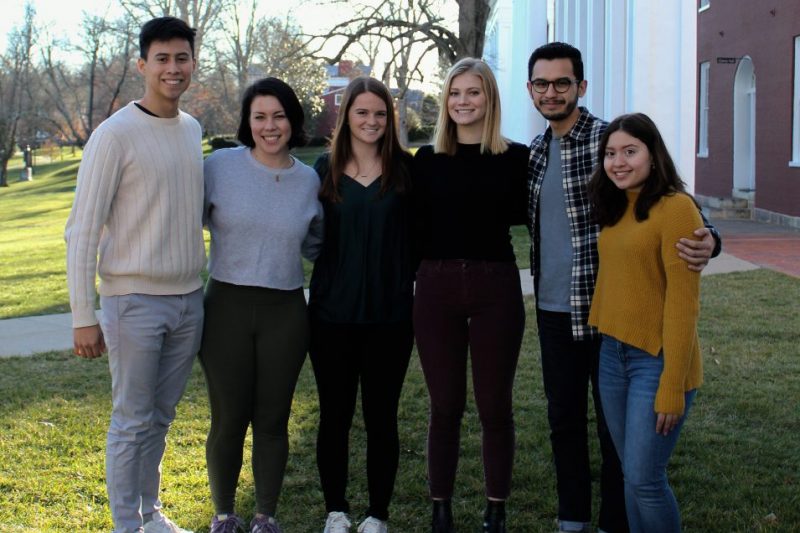 The 2019-20 ESOL leadership team at W&L, (l-r) David Gálvez ’22, Hannah Denham ’20, Curry Sherard ’21, Caroline Rivers ’20, Edwin Castellanos Campos ’20 and Jackie Tamez ’22. Photos by Katherine Ho ’23.
The 2019-20 ESOL leadership team at W&L, (l-r) David Gálvez ’22, Hannah Denham ’20, Curry Sherard ’21, Caroline Rivers ’20, Edwin Castellanos Campos ’20 and Jackie Tamez ’22. Photos by Katherine Ho ’23.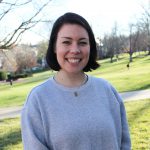 Hannah Denham ’20
Hannah Denham ’20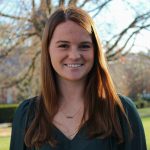 Curry Sherard ’21
Curry Sherard ’21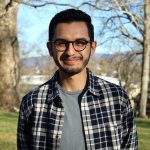 Edwin Castellanos Campos ’20
Edwin Castellanos Campos ’20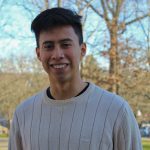 David Gálvez ’22
David Gálvez ’22
You must be logged in to post a comment.